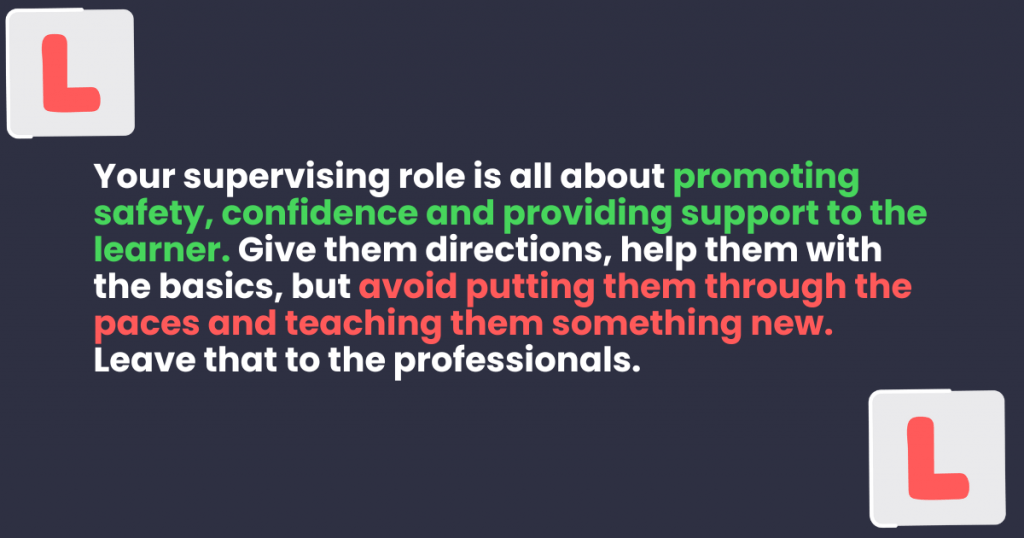Last Updated on February 20, 2025
Teaching a learner driver can be a challenging yet rewarding experience, especially for parents or guardians guiding their children through private driving practice. While professional driving lessons with an Approved Driving Instructor (ADI) are essential, additional hours of practice under the supervision of a trusted family member can significantly enhance a learner’s confidence and readiness for their driving test. This guide outlines key considerations for supervising a learner driver, ensuring a safe and supportive environment for effective private driving practice.
The Importance of Private Driving Practice
Private driving practice is crucial for learner drivers in the UK. It offers valuable hands-on experience that complements formal lessons with an ADI. Engaging in regular private practice helps learners apply theoretical knowledge in real-world situations, builds their driving skills, and prepares them for the practical driving test. Additionally, private practice allows learners to experience diverse driving conditions and scenarios, which are vital for developing comprehensive driving competence. By understanding the importance of private driving practice, supervisors can better support learners in becoming safe and confident drivers.

How to Safely Prepare for Private Driving Practice
Before beginning any private driving practice, it’s essential to ensure both the learner driver and the supervising driver are fully prepared. This preparation includes understanding the legal requirements for supervising a learner, such as having the correct learner driver insurance in place and ensuring the supervising driver meets the necessary qualifications. Supervisors must also confirm that the car being used for practise is roadworthy, properly taxed, and insured. Setting these foundations will help create a safe and productive learning environment for the learner driver.
It’s also beneficial for both the learner and supervisor to discuss goals for each practice session, such as focusing on specific skills or preparing for a variety of driving conditions. This preparation, combined with regular feedback, will ensure that private practice sessions are effective and lead to steady progress.
The Legal Requirements for Supervising a Learner Driver
Understanding the legal requirements for supervising a learner driver is vital for a safe and lawful experience. In the UK, supervisors must be at least 21 years old, hold a full driving licence for at least three years, and have proper insurance for the learner driver.
Additionally, learner drivers must display ‘L’ plates on the front and rear of the car whenever practicing, and they must never drive on motorways unless accompanied by an Approved Driving Instructor (ADI) in a dual-controlled car. Following these legal guidelines ensures the learner driver is fully compliant and helps prevent any legal issues that could affect their driving progress.
What You Need to Consider When Teaching a Learner Driver
Understand Your Role as a Supervisor
As a supervisor, your primary role is to support and supervise the learner driver, not necessarily teach them. The actual teaching should be left to the Approved Driving Instructors who are trained and qualified to impart the necessary skills and knowledge. Your job is to help the learner practise what they have learned during their lessons with a professional , ensuring they adhere to the specific rules of the road and develop safe driving habits.

Get a Learner Insurance Quote with Collingwood
Stay Calm and Supportive
Learning to drive can be a nerve-wracking experience for many young drivers. As a supervisor, it’s essential to maintain a calm and supportive demeanour. Losing your temper or becoming frustrated can increase the learner’s stress levels, negatively impacting their confidence and ability to learn. Encourage a positive learning environment by being patient, providing constructive feedback, and celebrating their progress.
Refresh Your Knowledge of the Highway Code
Even experienced drivers can benefit from revisiting the Highway Code. Familiarizing yourself with the latest rules and regulations will not only improve your ability to supervise effectively but also ensure that you are providing accurate and up-to-date guidance. This knowledge will help you support the learner driver in understanding and following the correct procedures and rules of the road.
Ensure Proper Insurance Coverage
When supervising a learner driver, it is crucial to have the correct insurance in place. Adding the learner to your existing policy is one option, but it may affect your no claims bonus in the event of an accident. Alternatively, consider taking out a separate learner driver insurance policy. This type of policy protects your no claims bonus and can also cover the learner when practicing in their own car. Learner driver insurance policies are specifically designed to provide the necessary coverage for private driving practice.
Choose Safe and Suitable Practice Routes
Selecting appropriate routes for practice sessions is vital for the learner’s development. Start with quiet residential areas to help the learner build basic skills and confidence before gradually progressing to busier roads and more complex driving situations. Ensure that the chosen routes provide a variety of driving experiences, including different traffic conditions, road types, and weather scenarios.

Focus on Building Confidence
Confidence is key to becoming a competent driver. Encourage the learner to take their time and practise regularly, reinforcing their progress with positive feedback. Avoid overwhelming them with complex manoeuvres too early in their learning journey. Instead, focus on mastering the basics and gradually introducing more challenging tasks as their confidence grows.
Emphasise the Importance of Defensive Driving
Teaching defensive driving techniques is crucial for the learner’s safety. Encourage them to be aware of their surroundings, anticipate potential hazards, and maintain a safe following distance. Instilling these habits early on will help the learner develop a proactive approach to driving, reducing the risk of accidents and improving their overall driving competence.
Keep Track of Progress
Monitoring the learner’s progress is essential for identifying areas that need improvement and ensuring they are on track for their driving test. Keep a record of their practice sessions, noting the skills covered and any challenges faced. Regularly reviewing this progress will help you plan future practice sessions more effectively and ensure a comprehensive learning experience.
Get a Learner Insurance Quote with Collingwood
Conclusion
Supervising a learner driver during private practice requires patience, knowledge, and a supportive attitude. By understanding your role, staying calm, refreshing your knowledge of the Highway Code, ensuring proper insurance coverage, choosing suitable practice routes, building confidence, emphasizing defensive driving skills, and keeping track of progress, you can significantly enhance the learner’s driving skills and readiness for their driving test. Remember, your guidance plays a crucial role in shaping a safe and competent driver.
FAQs
You must be at least 21 years old and have held a full driving licence for at least three years. Additionally, the vehicle must be insured for the learner driver.
Yes, a learner driver can practise without an ADI as long as they are supervised by a qualified individual and follow all legal requirements, including having valid learner insurance.
Regularly review the Highway Code together and encourage the learner to practise what they have learned during their professional lessons. Use constructive feedback to correct mistakes and reinforce positive driving habits.
Stay calm and provide constructive feedback. Explain the mistake and how to correct it, ensuring the learner understands the importance of safe driving practices. Avoid shouting or becoming frustrated.
While not legally required, logging practice hours can help track progress and identify areas that need improvement. It provides a structured approach to learning and ensures comprehensive coverage of driving skills.









